#POLY CYSTIC OVARIAN SYNDROME (PCOS)
Explore tagged Tumblr posts
Text
You mean these ovarian cysts are in a polycule?
3 notes
·
View notes
Text
Listen, people that hopefully come across this. If you feel alienated or something because you don't know who any of these characters are, DON'T LET THAT DISTRACT YOU.
This isn't about the characters, this is about something in real life that a lot of people NEED TO KNOW. Please, please, PLEASE reblog this and, if you can, use tags that apply to all the details in this comic so that it will reach as many people as you can
I am sincerely BEGGING you to reblog this. Even if you don't have tags, just reblogging will get more people to see it. PLEASE REBLOG. IT'S NOT HARD AT ALL. Just hit the reblog button AT LEAST. Please.
Putting all of the tags on this took a simple five minutes. I swear that's the maximum. Please just reblog.
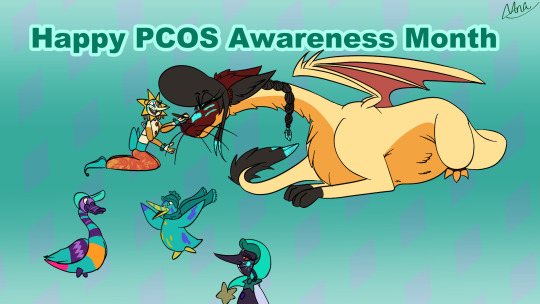
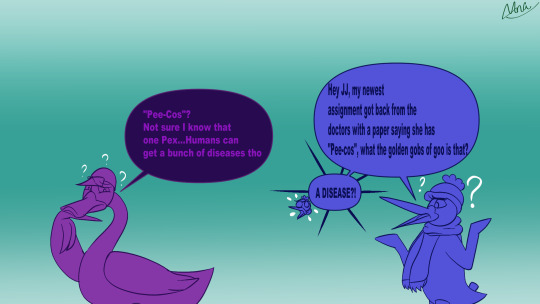
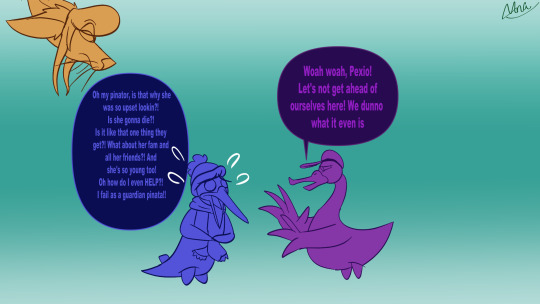
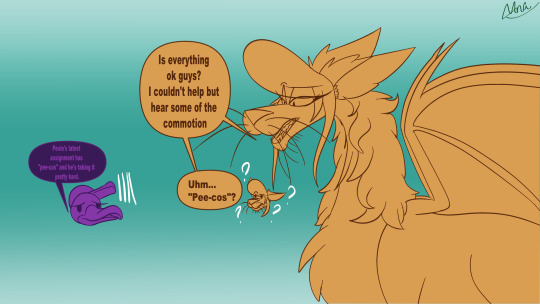
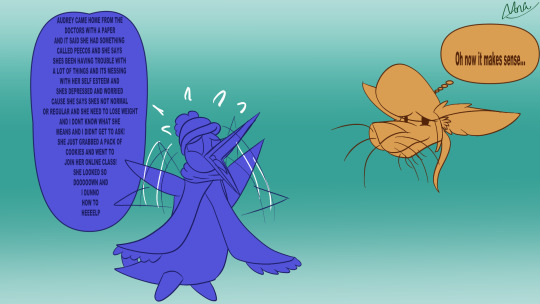
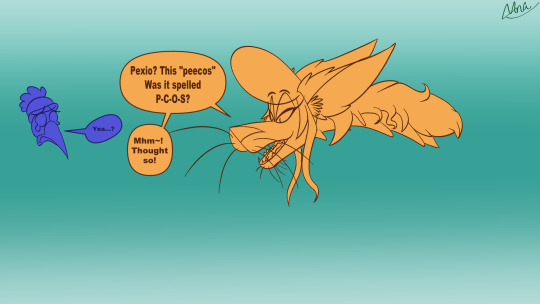
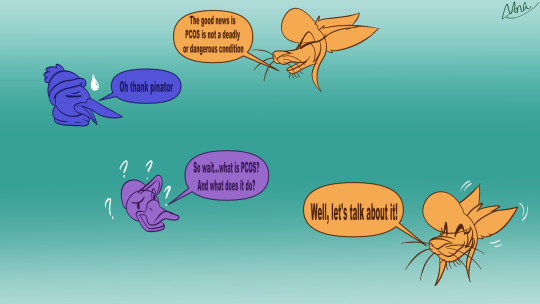
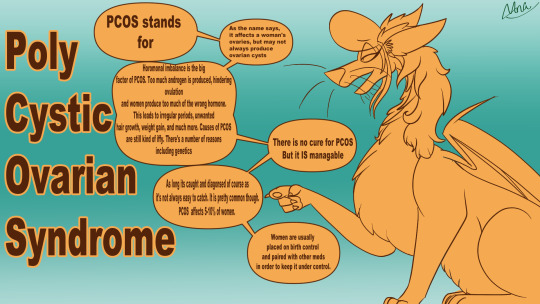

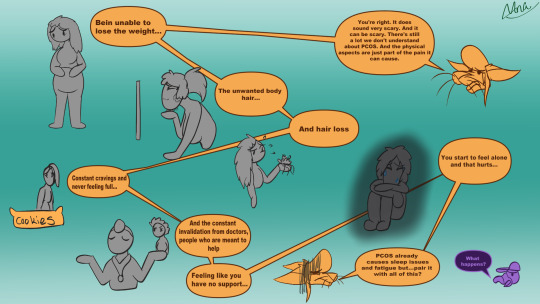
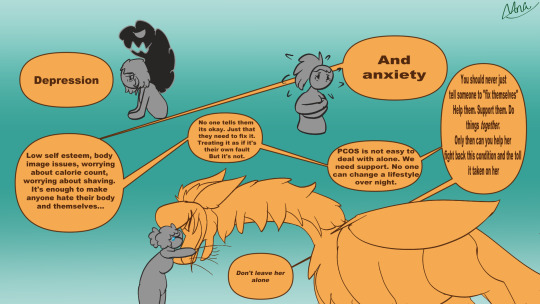

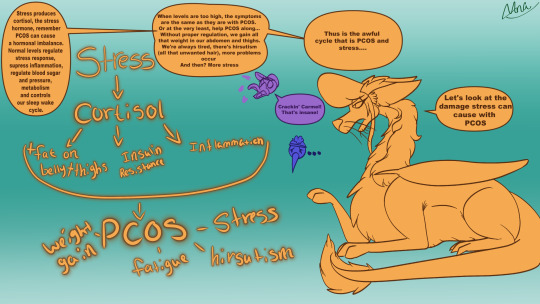
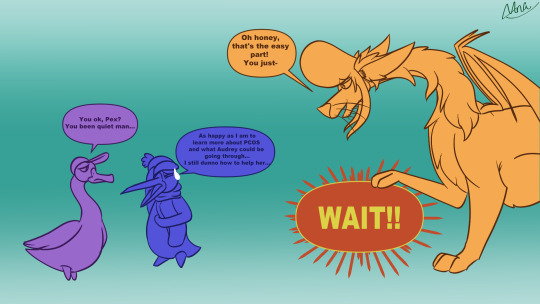
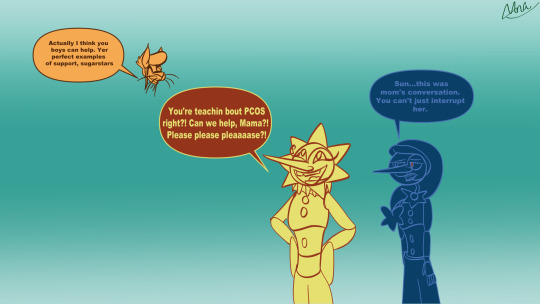
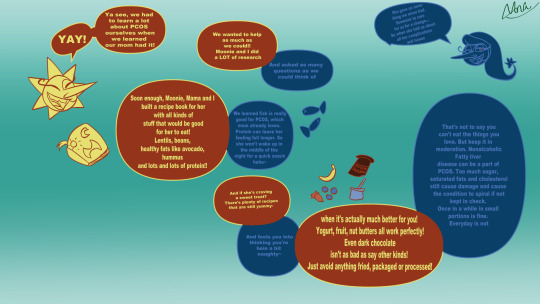
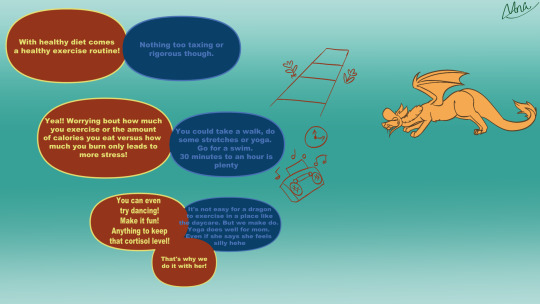
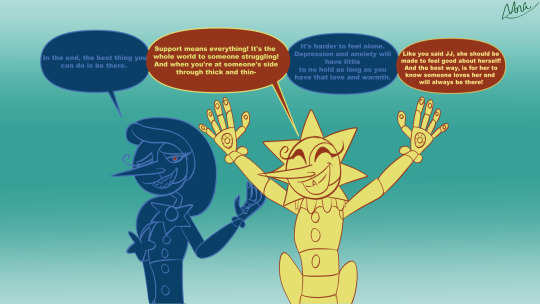
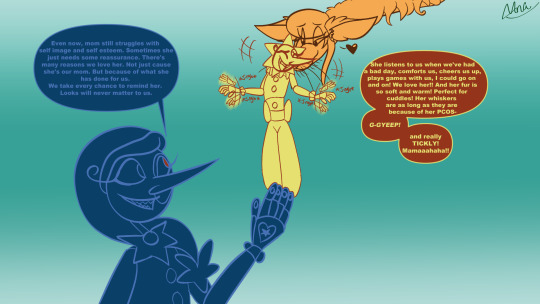
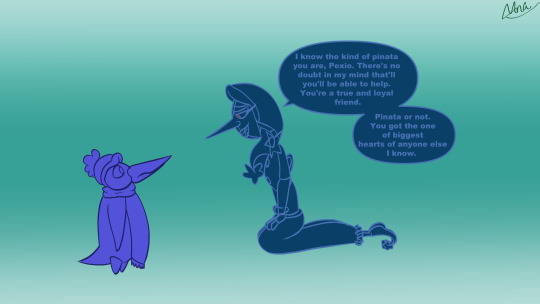

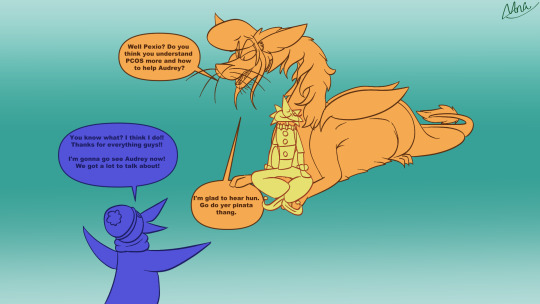
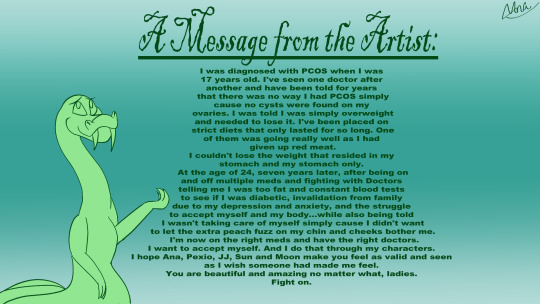
September is PCOS awareness month. I've been hard at work on this comic. I've used my comfort ocs and characters in order to describe my experience with PCOS. I always put a part of myself in my ocs when I make them. In this comic, Pexio is worried he can't help the human he's assigned to as a guardian pinata because he doesn't understand the condition she's been diagnosed with. Ana teaches Pexio and JJ about PCOS and the effects it can have on women mentally, emotionally and physically. (with Sun and Moon's help) If any of my art were to blow up and get a ton of attention, please let it be this comic. I was invalidated, lost and hating myself thanks to my PCOS, other conditions and issues on top of it and...toxicity. I still am. Even with some of the help I'm finally getting after so long. If I can do one thing, I want to touch someone's heart. I want to make them feel seen and valid. I want to give someone else the validation and love that I didn't get. I hope you enjoy the comic :3 I put my heart and soul into it.
#pcosawareness#pcosjourney#pcos#poly cystic ovarian syndrome#real life problems#health awareness#good health is a right for all humans#be kind#you are beautiful#you are valid#you are loved#health education#respect#acceptance#wise words#show support#spreading love#be brave#empathy#compassion#mental and physical health#fnaf#fnaf sb#five nights at freddy's#five night freddy's security breach#fnaf daycare attendant#sundrop#moondrop#viva pinata#dragon dog oc
95 notes
·
View notes
Text
Also preserved in our archive
by Lydia Wilkins
“Come back to me when you start wanting children,” my gynecologist said. I had asked about the implications on fertility, thanks to my Poly-Cystic Ovarian Syndrome (PCOS) diagnosis — and was dismissed once again. It enveloped me with such despair.
For over two years I was shunted between varying medical offices, from primary care to an STI clinic. Among many disabling symptoms, I was experiencing hair loss and excessive hair growth along my jawline since my SARS-C0V-2 infection. After developing Long COVID in March 2022, doctors considered me a “medical curiosity” and tested me endlessly, leading to wrong diagnosis after wrong diagnosis. I was prescribed medication after medication, but nothing seemed to help.
Eventually, I added another diagnosis to my chart when I was diagnosed with PCOS by a gynecologist. The hormonal condition is lifelong, presenting with symptoms such as excessive hair, hair loss, fatigue, and irregular periods. The World Health Organization recognizes PCOS as a leading cause of infertility; you are also at risk of other conditions such as diabetes. The gynecologist additionally said there was a possibility that I have endometriosis, in which tissue from the uterus grows in places where it should not be. Endometriosis is recognized for extreme levels of life-impacting pain and is also associated with infertility.
The impact of Long COVID on sexual health is still not fully known, but there are serious signs of sexual and reproductive health being impacted. To be a disabled woman who has to advocate for herself, with the research, in the face of medical indifference is beyond exhausting. At every stage, I have correctly diagnosed myself, while specialists would play “catch-up.”
Why are medical experts and public health officials not sounding the alarm, to warn the public about the impact of Long COVID on fertility?
Like COVID-19 which leaves inflammation in its wake, PCOS is also thought to be an inflammation-related condition. PCOS is primarily a hormonal condition that impacts an estimated one in ten women and may put you at higher risk of severe COVID-19, according to research. PCOS can also make it more difficult to get pregnant, or, like endometriosis, increase complications during pregnancy.
I still have so many questions, such as if there is anything I could do now to mitigate the chronic nature of PCOS. Yet, doctors continually fob off these questions, shrouding me in a patronizing expectation of “having to wait until you start having children,” as if once I am interested in children, I will gain admission to an elite secret club of better care.
The UK campaigning group Long COVID Kids has documented the wider impact of Long COVID on reproductive health — such as changes to menstruation and triggering menopause. The same post also points to a study of the negative impact on ovarian function, along with other triggered conditions such as ovarian cysts.
A Patient-Led Research Collaborative review also found that women with Long Covid had increased rates of reproductive health issues — including, but not limited to, endometriosis, infertility, ovarian cysts, and other conditions. The review also mentioned another condition I am waiting to be tested for, after two years of misdiagnosis — POTS (postural orthostatic tachycardia syndrome). Why are these conditions not considered in tandem with each other, to save time and needless testing that causes nothing but distress?
We also know that COVID-19 tends to disrupt menstruation, as well as “fertility potential.” COVID-19 impacts male fertility, too, reducing sperm counts even after mild infections and causing erectile dysfunction. Some people with Long COVID are opting out of having children altogether, because of the strain of delivery and childbearing to the body, or because of the inability to raise or financially support a child.
Before catching COVID-19, I was bouncy, energetic, and socially confident. I had never had any notable health issues; now, my hair falls out in clumps, enough that my hairdresser has adapted to hide the thinning hairline. Excessive hair growth dominates my jawline and eyebrows. There’s also acne, dark spots of skin, and tense bloating warranting “she’s pregnant!” commentary from friends, family, and colleagues. There are few resources on how to cope with such an overwhelming diagnosis and aftermath.
I have been disabled from birth — but attempting to access reproductive healthcare with Long COVID has been a rough learning experience. Thanks to a litany of traumatic experiences when seeking relief from Long COVID, I am now obliged to take a chaperone with me to all medical appointments. Medical professionals speak to my chaperone as if they are the patient — “what can I do to help?”
We are told we have to trust medical professionals — but that trust is a privilege not afforded to disabled people in healthcare settings.
I, in turn, am the “sweetheart” spoken at with “the voice.” Disabled people everywhere know it — slow and childlike, patronizing and loud. I am not afforded dignity or privacy as a result. Other professionals have asked for free disability education instead of discussing my symptoms; it’s an inappropriate presumption, as well as beyond bitterly distressing.
My care was also marked by desexualization, or being reduced to the presumed state of a child. Doctors assumed, “she’s disabled — so she won’t be interested in any of that,” as Lucy Webster documented in her book, The View From Down Here.
Disabled women learn to suppress our anger to achieve any kind of diagnostic result, never “speaking to” the weighted horror. We have dreams, too — but they are tempered by societal commentary, both inside and outside a medical setting. I used to dream of an ordinary life, maybe a life of growing old with a partner, a house, a family in some way. Now, I realize it would be a privilege to not be questioned about these wants or to not be subject to constant commentary.
Women have long been advocating for better reproductive healthcare in the Western world; PCOS has long been misunderstood, with treatment often merely consisting of being told, “just lose weight.” A lack of curiosity has written off reproductive healthcare as only “a woman’s issue” for far too long.
More research on the emerging connection between reproductive health and Long COVID is needed, as is a deliberate culture shift in any caring profession. That can only start with education aimed at ending ingrained stigma. Health is a collective concept — and if we forget that, the pandemic has taught us nothing.
#long covid#covid is airborne#mask up#covid#public health#wear a mask#pandemic#covid 19#wear a respirator#still coviding#coronavirus#sars cov 2
104 notes
·
View notes
Note
I feel so stupid to say this but I'm a trans man, but I have a lot of learning disabilities so I'm trying to understand things better. I was born AFAB but I'm trying to understand how "bio sex" works and if it is even real. I've heard a lot of people say it isn't but that makes me feel sorta as if my transness isn't valid then. I do not agree w trans meds at all, they're terf lites and their "male/female brain" stuff is so wrong. But I'm curious since the brain isn't gendered, what makes us the bio sex we are? I get gender is different and it is WHO we are and how we think and present etc but can you explain bio sex please? :) I also really want phallo and top surgery and it makes me curious how gender which is a social construct has an urge to match up with biology somehow? Like how come my dysphoria feels so bad that I lack a dick..how does my gender want that?
Hoo boy. Biological sex is actually really complex. It’s made up of your sex chromosomes, sex hormones, primary sex characteristics developed as a fetus, secondary sex characteristics developed in puberty, and I think a few other factors I’m forgetting. All of these elements are not binary (meaning there are only two options), but instead bimodal (meaning there are two options that are the most common, but there are others).
So using myself as an example, my chromosomes are unknown because I’ve never been karyotyped (tested for sex chromosomes); my endocrine system is almost completely testosterone-based; I have zero “female” reproductive organs and most of the “male” ones (minus testes); and I have a few “female” sex characteristics (undeveloped hyoid (Adam’s apple), wide hips, narrow shoulders, smallish hands & feet) and many “male” ones (deep voice, broad jaw, flat chest, vascular hands, body hair, facial hair, male pattern alopecia, male fat distribution, lower body temperature, high sex drive). So without knowing what my chromosomes are, by all accounts I’m male.
The whole male brain/female brain thing has been pretty well debunked. There are only subtle differences between the brains of cis men and cis women at the population level, and those physical differences that do exist are most likely caused by differences in socialization for certain skillsets. In other words, if you teach boys and girls that they’re supposed to be good at different things as they’re growing up, their brains will develop to be better at those things that they practice from an early age—be that fine motor skills, or telling colors apart, or interpreting other people’s tone and moods, or being empathetic, etc. Obviously there are disabilities that can stand in the way or complicate matters, but there’s something called the Pygmalion effect where if you consistently tell a child that they’re good at a certain thing, they will BECOME good at it—and if you consistently tell a child they’re bad at a thing, they will do poorly at it.
Something I find really interesting, talking about the link between biological sex and gender identity, is the prevalence of PCOS (poly-cystic ovarian syndrome) in trans men. The rates shown by studies varies a lot, but taking average rates, about 5% (1 in 20) AFAB people have PCOS, but about 60% (3 in 5) trans men have it. PCOS is an endocrine condition (and, arguably, an intersex condition) that has a slew of effects, and one of those is relatively high levels of androgens like testosterone. The REALLY interesting part is that PCOS medications that decrease testosterone and increase estrogen result in MORE gender dysphoria for trans men and LESS in cis women! I remember before I even figure out I’m trans, my mom told me I needed to get on metformin to decrease testosterone and boost estrogen, and the very thought of it made me nauseous and angry!
A possible interpretation of that is that there is an intrinsic link between our gender identity and our physical sex that opposes our primary sex characteristics. In other words, we’re MEANT to be men and our bodies know it.
(Now, things like this on the trans woman side, I will admit I don’t know offhand; you’d have to ask a trans woman who follows medical science. I would point you to my sister because she fits the bill, but we have an unspoken agreement to keep our online lives separate for privacy. That is to say, I don’t remember her blog name lmao sorry sis)
But yeah. The thing about top and bottom dysphoria is that it isn’t like social dysphoria where it depends on how you’re seen by others. It’s an internal knowledge—a gnosis, if you will—that something is WRONG regardless of what others think, say, or do. Speaking for myself again, sure you can be a man without a dick, fine, whatever, but I, personally, was supposed to have one. It wasn’t the social construction of what masculinity is supposed to entail that made me hate my tits and cooch, it was the fact that they felt horrible and wrong and I knew I was meant to have a flat chest, dick, and balls instead. And that feeling of wrongness started at a very young age, if I’m honest; I just didn’t have the vocabulary and knowledge to identify it until my mid-20s.
How does this relate to my PCOS? We don’t actually know. But don’t you think it’s interesting that the signs that I was trans were there long before my first puberty awakened the PCOS in the first place?
Gender roles are a fluid social construct. What’s considered masculine and feminine change with culture and time. But gender identity is, as far as medical science can figure, hardwired in the brain. For most people, by happy coincidence of sex and gender being bimodal, their physical sex (as complex as it is!) and gender identity more or less align, and they never really have to think about it. For others, there is a natural misalignment between the two—and it can take quite some time to figure it all out, because our cultures try very to force a bimodal spectrum into a binary box.
I think I’ve rambled enough, hey? Let’s see if my dogshit wifi will let me post this without losing everything.
#trans men#transgender#trans matters#gender identity#gender dysphoria#ftm#queerdom#replies to things
64 notes
·
View notes
Text
Alright so I didn't want to share personal information but this may affect my writing so I feel you all deserve an explanation. I have PCOS (Poly-cystic Ovarian Syndrome) and I am currently/ have had for the past ten minutes the mother of all cramps. I am not too concerned because no blood or discharge is present to indicate an underlying issue like a cyst popping or an infection, my monthly is about a week or so away so I'm assuming either ovulation or pms, while cramps and pain are nothing new to me this level is a once in a blue moon event for me.
So if this continues I'm not gonna be writing I'm gonna be in bed with a heat pack. I took some ibuprofen so maybe that'll help, when it gets this bad I usually opt for Midol but I couldn't find it so this'll have to do. Anyway, all this is to say that if this a precursor to the main event then everything may get pushed back by up to a week and I sincerely apologize. I'll write when I'm not feeling like my insides are trying to kill me.

#pcos#memes#hazbin hotel memes#unfunny memes#ao3 writer#classificationhell#sorry#classification hell au#i apologize#thank you for your patience#ao3 writer curse is at it again i guess#some write through the pain but im a pussy
13 notes
·
View notes
Note
Just read on of ur posts while I'm curled up in the corner of my room crying bcuz of period pain, what pcos or whatever the post said abt extreme period pain not normal?
(pcos is poly-cystic ovarian syndrome. It causes irregular, painful and often really heavy periods. It can also cause insulin resistance, make it difficult to lose weight and excessive or 'male pattern' hair growth, basically like extra hair on the upper-lip, stomach and back. Despite the name, it's not actually cysts that cover the ovaries, just over active follicles making a build up of sorts. There isn't any cure to pcos and usually they'll say that being on birth control and trying to lose weight is the best way to lessen some of the symptoms. Endometriosis is another condition that causes painful periods, although I am less informed on that one so you'd be better off googling it.)
3 notes
·
View notes
Note
HC: Thursday
send (HC: the name of one of my muses) and i’ll give you 5 random headcanons about them! feel free to specify if you want them to be relationship headcanons involving your muse.
Thursday has a medical condition called PCOS (poly-cystic ovarian syndrome), which a hormonal disorder. Some of the symptoms include irregular or absence of periods, infertility, weight gain, acne, depression, and hair growth in "unwanted" areas. Thursday in particular experiences absence of periods, infertility, weight gain/obesity, depression, and body acne.
Her name at birth was Charlotte Salvatore. When the Dampening mist took her as a host, she lost all of her memories, including the memory of her name. Cyrus is the one who named her Thursday, because for some reason the first question she asked was what day of the week it was. Cyrus found the nearest calendar, which was still marked with the day the mist attacked, which was Thursday, March 17, 2011. Although she did eventually regain her memories, Thursday decided to keep her new name, because her life as Charlotte had effectively ended upon learning that everyone she knew from before the Office had perished in the apocalypse and everyone else already knew her as Thursday.
Thursday may hate formal exercise, but she actually loves going outside and walking around! She loves urban exploring, hiking through woods, taking long walks on the beach, just any kind of walking around and looking at things. Even climbing trees, if she can manage it (she sure as hell will try!).
In conjunction with the above headcanon, she is curious to no end, and this fairly often leads to her getting stuck in situations that are dangerous. She's lost track of the number of times she's died/been killed as a result of her own curiosity. Cyrus would argue it's stupidity, though.
She loves to banter. It does not take long after meeting her to figure this out. Different kinds of banter with her mean different kinds of things. Stick around her long enough and you might be able to catch onto her different types. There's friendly banter, argumentative banter, manipulative banter, flirtatious banter, silly banter, and absolutely straight up bullshitting banter.
3 notes
·
View notes
Note
Hey darling! Love how you write the hg boys. I was thinking maybe you could write something comforting with how they would react to a reader with PCOS (poly cystic ovarian syndrome). I’m diagnosed and lemme tell ya it’s no joke. Your in chronic pain almost all of the time when you eat, turn a certain way, when you use the bathroom, even if you walk around for a bit too long. Almost anything can cause a flare up and when the cysts burst… my god I feel like I’m going into labor and I get full body shake. If you do write it feel free to reach out for more into on the matter. I know from personal experience how tough the condition can be. Sending all the lovins!!! ~Jazz🥰💋❤️❤️❤️❤️❤️❤️❤️
hi sweetheart tysm for the ask!! i’m so sorry this is something you’re going through, i know ppl with this disorder and it seems so hard, my heart goes out to you❤️❤️❤️
unfortunately i don’t think i’m well-educated enough on the topic to write this, and i’m also currently trying to take a break from writing the hunger games boys hcs to avoid burnout.
i hope someone else is able to write this for you, i’m so sorry i’m not up to it atm❤️❤️❤️
4 notes
·
View notes
Text
some of the stuff about hormone deficiencies/irregularities don’t really make sense to me
why is PCOS (poly CYSTIC ovarian syndrome) called that when you don’t have to even have cysts to be diagnosed with the disorder? high testosterone levels don’t CAUSE cysts, so the only logical explanation is that the cysts are what causes the testosterone levels (lowering of estrogen developed from the ovaries).
but if it’s not caused by cysts, then why would it be associated with that condition? those are two different things, since the causation is NOT THE SAME??!!!,!:!;$;$
pcos isn’t even the only CONDITION that causes high testosterone in females. i was diagnosed with pcos and was prescribed birth control, and was blamed for my diet, but i was just recently diagnosed with hashimotos, which is an autoimmune thyroid disease that LITERALLY CAUSES HIGH TESTOSTERONE LEVELS IN FEMALES!!!!!!!
another reason is literally just being intersex. like nothing else you’re just LIKE THAT. i’m fucking going insane. a bunch of shit in the medical field is understudied and misunderstood and i’m here like “HEY i don’t have a medical license and im not making any conspiracy that doesn’t make sense im just talking about facts and the facts lead to this thing being wrong!!!” and no one will listen because im not liable and there’s too many weird people i just want to help
anyway i think they should stop immediately prescribing birth control to people with no further research into what’s going on with the patient that’s kinda fucked up considering how fucking damaging they can be. some people just have different levels and it doesn’t affect them health wise. fucking god.
2 notes
·
View notes
Text
Medically speaking, intersex conditions and females specific issues like Endometriosis and PCOS are not the same.
An intersex condition is a differential development regarding chromosomes, so someone may have xxy or yyx rather than the typical xx/xy. This can impact the development of the genitalia, puberty, can cause infertility.
Endometriosis is a condition where cells similar to the lining of the uterus grows outside of the uterus. It can cause severe pelvic pain, it can impact the function of the bowel and bladder, cause pain during sex, and infertility.
PCOS (Poly-Cystic Ovarian Syndrome) is a hormonal disorder where the ovaries produce androgens at irregularly high levels. It can cause irregular periods, missed menstrual cycles, infertility, and the development of cysts on the ovaries.
Now, these issues all have some overlapping traits, mostly infertility, abnormal hair growth, and higher likelihood for comorbid conditions, but that does not make them the same.
I think part of why people don't like to call PCOS and gynecomastica intersex is because it challenges the image of intersex people being super rare. We're more common than you think.
19K notes
·
View notes
Text
PCOS AND AYURVEDA : A Holistic Approach to Managing Polycystic Ovary Syndrome

PCOS or Poly Cystic Ovarian Syndrome is a group of disorders affecting women of reproductive age and one among the common reasons found today for irregular menstrual cycle. Say it because of sedentary lifestyle or food habits, it sure is a menace for womanhood.
According to WHO, PCOS affects 116 million worldwide, PCOS affect approx. 10 percentage women in the reproductive age.
What is PCOS?
It is a disorder where the ovaries produce higher than normal level of male hormones (androgen) causing an imbalance in the system leading to trouble in normal ovulation and release of eggs (Ovum). Some of the ovum develops into fluid filled sacks called cyst which may even grow bigger in size.
WHAT CAUSES PCOS?
It is an endocrine disorder directly connected to the level of hormones in the body.
1. Increased level of male hormones (Androgen) — A smaller level of male hormones presents in every woman. Whereas its increase leads to imbalance triggering male traits such as extra hair growth, male pattern baldness and acne.
2. Increased level of Insulin — Insulin is a hormone regulating blood glucose level in the body. It helps in conversion of the food we eat into energy. Those with unhealthy eating habits, little to no-exercise, overweight or obese have higher chances of increase in blood glucose level and insulin resistance, which means their cells can’t take up insulin properly. When cells can’t use insulin properly, the demand in body rises thus triggering pancreatic cells to produce more insulin for supply. This extra insulin circulates in the body which in turn triggers ovaries producing male androgen.
3. Inflammation — Studies have linked excess inflammation to higher androgen levels. Inflammatory condition might be a contribution of overweight too.
HOW YOU KNOW YOU HAVE PCOS?
Some woman gets early symptoms whereas some go unnoticed until they find difficulty getting pregnant. You should notice it when there is,
· Irregular periods · Heavy menstruation · Excessive hair growth · Thinning of hair · Weight gain · Acne · Darkening of the skin in body creases like on neck, groin and under the breasts. · Headache
WHY PCOS A CONCERN?
Infertility: Fertilization happens only if there is a release of ovum. Woman who don’t ovulate thus find it difficult to conceive and is a major cause of infertility in woman. Metabolic diseases: Obesity and PCOS go hand in hand, slowing the metabolism. Hence woman with slow metabolic rate have higher chances of high blood sugar, LDL cholesterol, high blood pressure.
CAN ONE CONCEIVE WITH PCOS?
Woman with PCOS have trouble getting pregnant, if conceived they have higher chances of premature child birth, miscarriage, high blood pressure and gestational diabetes. However, woman with PCOS can get pregnant with infertility treatments.
ROLE OF AYURVEDA IN MANAGING PCOS
Efficiency of Ayurveda treatments and regimen are found in studies regarding management of PCOS.
Ayurveda focuses on balancing the metabolism and maintaining equilibrium of bio-energies. The metabolism which is lowered ion PCOS will be boosted with Ayurveda treatments and increases chances of conception. Ayurveda uses herbal formulations to correct the hormonal imbalance and regulates the normal rhythm of body. It also requires you to go through various types of therapies and maintain a balanced diet. All these play a vital role in overcoming PCOS - related problems.
The holistic approach includes a combination of dietary changes, lifestyle modifications, herbal remedies, and therapies aimed at restoring balance to the doshas and promoting overall health.
Read more....
0 notes
Text
PCOD Homeopathy Treatments
PCOD (Poly Cystic Ovarian Disease) or PCOS (Poly Cystic Ovarian Syndrome) is a disease characterized by multiple small sacs filled with fluid in the ovaries. Patients with PCOD have abnormal levels of hormones that result in irregular menses, infertility and certain masculine changes in the body.

Book An Appointment For Consultation | +91-7411955955 | +91-7411055955 | +91-9036619944 | 080-41241822|
#PcosSymptomsAndTreatment, #HomeopathicTreatmentForPcos #homeopathyclinicinbangalore #homeopathytreatment #treatmenthomeopathydoctors #homeopathyclinicinmysore #homeopathyclinicinhubli #richcarehomeopathy #richcarehomeopathytreatment
#pcod Treatments#pcod#homeopathy treatments#pcod homeopathy treatments#bangalore treatments#Richcare Homeopathy
0 notes
Text
Homeopathic Interventions for Poly cystic Ovarian Syndrome: A Comprehensive Overview
Homeopathic Interventions for Poly cystic Ovarian Syndrome: A Comprehensive Overview

As you know, Homoeopathic is the traditional or ancient mode of medicine..Homeopathy is used to treat a wide variety of ailments, including colds, upset stomachs, pain, and menopausal hot flashes. However, there is limited evidence proving the effectiveness of homeopathic treatments.
Homeopathy, a system of medicine founded on the principle of 'like cures like,' offers a unique perspective and effective remedies for various health concerns faced by women across different stages of life.
Polycystic Ovarian Syndrome (PCOS) is a common endocrine disorder affecting individuals of reproductive age. Homeopathic treatment for Polycystic Ovarian Syndrome Characterized by hormonal imbalances, ovarian cysts, and irregular menstrual cycles, PCOS can lead to a range of symptoms from infertility to metabolic complications. While conventional treatments often involve hormonal medications and lifestyle changes, many individuals are exploring alternative therapies like homeopathy for relief. In this blog post, we'll delve into the principles of homeopathy and explore its potential role in managing PCOS symptoms.
Understanding PCOS: A Brief Overview
Before diving into homeopathic treatments, it's essential to grasp the basics of PCOS. Typically diagnosed through a combination of symptoms, physical examinations, and hormonal tests, PCOS presents with:
Irregular menstrual cycles
Excess androgen levels leading to acne, hirsutism, and male-pattern baldness
Ovarian cysts visible on ultrasound
The Principles of Homeopathy
Homeopathy is a holistic system of medicine developed in the late 18th century by Dr. Samuel Hahnemann. Based on the principle of "like cures like," homeopathy uses highly diluted substances to stimulate the body's natural healing processes. Homeopathic treatment for Polycystic Ovarian Syndrome The individualized approach of homeopathy considers the entire person, including physical, emotional, and mental aspects, to select remedies.
Homeopathic Remedies for PCOS
While individualized treatment by a qualified homeopath is recommended, several remedies are commonly considered for PCOS:
Pulsatilla: Often prescribed for individuals with hormonal imbalances leading to irregular periods, mood swings, and weepiness.
Sepia: Useful for those with a history of irregular menstrual cycles, irritability, and a feeling of detachment.
Lachesis: Indicated when there's a history of suppressed emotions, especially associated with menstrual irregularities.
Calcarea Carb: Considered for individuals who are overweight, experience excessive sweating, and have a tendency towards cold extremities.
Natrum Mur: Prescribed for those with irregular menstrual cycles, acne, and a history of grief or emotional suppression.
The Importance of Individualized Treatment
It's crucial to recognize that homeopathy is not a one-size-fits-all approach. Homeopathic treatment for Polycystic Ovarian Syndrome TEach individual with PCOS will have unique symptoms, histories, and susceptibilities. Therefore, consulting with a qualified homeopath who can prescribe the most suitable remedy based on a thorough assessment is essential.
While homeopathy offers a gentle and holistic approach to managing PCOS symptoms, it's essential to integrate it with conventional medical care. Regular monitoring, lifestyle modifications, and a collaborative approach between conventional and alternative healthcare providers can offer the most comprehensive care for individuals with PCOS.
If you or someone you know is considering homeopathic treatment for PCOS, consult with a qualified homeopath to discuss personalized treatment options tailored to individual needs.Characterized by hormonal imbalances, ovarian cysts, and irregular menstrual cycles, PCOS can lead to a range of symptoms from infertility to metabolic complications. While conventional treatments often involve hormonal medications and lifestyle changes, many individuals are exploring alternative therapies like homeopathy for relief. Homeopathic treatment for Poly cystic Ovarian Syndrome In this blog post, we'll delve into the principles of homeopathy and explore its potential role in managing PCOS symptoms.
0 notes
Text
Signs symptoms of Pcod | Homeopathy Treatments in Bangalore
PCOD (Poly Cystic Ovarian Disease) or PCOS (Poly Cystic Ovarian Syndrome) is a disease characterized by multiple small sacs filled with fluid in the ovaries. Patients with PCOD have abnormal levels of hormones that result in irregular menses, infertility and certain masculine changes in the body.

Signs and Symptoms
Symptoms of PCOS typically start soon after a woman begins to menstruate. The type and severity of symptoms varies from person to person.The most common characteristic of PCOS-
Irregular menstrual periods.
Decrease in female sex hormones leads to excesshair on the face, chest, stomach, thumbs, or toes.
Decrease in breast size.
Deeper voice.
Thin hair.
Book An Appointment For Consultation | +91-7411955955 | +91-7411055955 | +91-9036619944 | 080-41241822|
#PcosSymptomsAndTreatment, #HomeopathicTreatmentForPcos #homeopathyclinicinbangalore #homeopathytreatment #treatmenthomeopathydoctors #homeopathyclinicinmysore #homeopathyclinicinhubli #richcarehomeopathy #richcarehomeopathytreatment
#pcod homeopathy treatments in bangalore#pcod#pcod treatments in bangalore#homeipathy treatments in bangalore#Richcare homeopathy treatments#Richcare
0 notes
Text
Gynec Laparoscopy Surgery
The advantages of laparoscopy surgery are numerous and include the following:
Less Post-Operative Discomfort.
Faster Recovery.
Smaller, more discrete Scars.
Reduced Risk of Complications.
Laparoscopic And Endoscopic Gynec And Infertility Procedures
Gynecology is that branch of medical science which specializes in the health of women in relation to her genital system. Women’s genital system is comprised of reproductive organs which includes the uterus where the fetus grows, the cervix which is the opening of the uterus to the vagina, the ovaries which produce the sex hormones and eggs, the fallopian tubes which carry the egg from ovaries to the uterus and the vagina which is a muscular tract from the cervix to the outside of the body.
Diagnostic Laparoscopy
Tubal Patency Test
Inability to conceive a child experienced by a couple even after living together and trying for the same is considered as infertility. One of the major causes for this condition is the block in the fallopian tubes. If the tube is completely blocked the sperm will not able to reach the egg and fertilize it. But in cases of partial block the sperm may reach the egg and fertilization may take place. But it is possible that the embryo may not reach the uterus and may be trapped inside the fallopian tube. This is a dangerous condition known as ectopic pregnancy.
Tubal Reconstruction
Fallopian tubes are tubular passages that connect endometrium in the uterine cavity to peritoneal cavity. After ovulation the ovum is captured by fallopian tubes and serves as a passage for its journey to the uterus. Fertilization of the egg by the sperm takes place in the fallopian tube. The embryo so developed continues its travel to the uterine cavity through the fallopian tubes. In the uterine cavity the embryo gets implanted in the endometrium. Ovum and the embryo is not having any intrinsic mobility. Fallopian tube functions as a passage and transporter of the ovum and the embryo. Fallopian tube also helps the sperm to travel to the spot of fertilization. Thus the existence of fallopian tubes is a prerequisite for normal pregnancy in a woman. Functions of fallopian tube can be disrupted by various infections and diseases which may end up in infertility and in severe cases it may lead to sterility also. Reconstruction of fallopian tube is the traditional treatment option for fallopian tube problems.
Fimbrioplasty
Fimbrioplasty is a reconstructive procedure used to correct problems in the fallopian tube. Fimbrioplasty has the advantage that it takes care to preserve and release the delicate fimbariae, which is very important in making pregnancy possible. This surgery is usually conducted only after making a comprehensive study about the infertility problem faced by the couple under investigation
PCOD drilling
Poly cystic ovary syndrome (PCOS) is situation in women resulting from hormone imbalance which may lead to non ovulation and consequent infertility. Women who are having poly cystic ovary syndrome can be made ovulating by following a surgical procedure known as laparoscopic ovarian drilling. In this procedure laser beams or electrocautery is used to smash parts of ovaries. This surgical procedure is not generally used. But for women who are not ovulating in spite of undergoing medication for infertility and after losing weight, this surgery has been found to be extremely useful.
Adhesiolysis
Scar tissue formed consequent to surgeries or that are formed between organs are known as adhesions. About 90 % of patients who undergo abdominal surgeries have been reported to develop adhesions. They are normally asymptotic and do not pose any threat to the life of the patients concerned. There are possibilities that adhesions may cause severe bowel problems.
Laparoscopic Treatments
Endometriosis
Lining inside the uterus is medically referred as endometrium. Endometrium thickens during the follicular phase of the menstrual cycle. If conception occurs endometrium under goes decidualization. The fetus derives nutrients and oxygen form the endometrium. If conception does not occur endometrium breaks down and is passed out through menstruation.
Total Laparoscopic Hysterectomy
Total laparoscopic hysterectomy is the surgical procedure used to remove a woman’s uterus. Conditions like fibroids in uterus, cancer of uterus, ovaries, cervix, uterine prolapsed, and endometriosis, pelvic pain, vaginal bleeding etc are some of the causes which necessitate the removal of uterus.
Lap Radical Hysterectomy
Endometrial cancer is the abnormal growth of cells in the lining of the uterus. Removal of uterus as a result of cancer is medically referred as hysterectomy. When the uterus, fallopian tubes, ovaries and cervix are removed, it is known as total hysterectomy. When only the uterus and two third portion of the vagina are removed in a surgical procedure, that procedure is known as radical hysterectomy.
Laparoscopic Surgeries On Ovaries
A pair of ovaries located on both sides of uterus are most important organs of the human body which produces eggs for the reproduction purpose. But the ovaries can be dysfunctional due to the existence of cysts, polyps, tumors etc. There a lot of treatment options for the successful management of this disorders. Even though medications have been found to be very affective in controlling and relieving the symptoms, the eradication of the disease or disorder is usually accomplished by surgical removal of the affected ovary or ovaries and the adjacent structures like fallopian tubes uterus etc.
Ovarian Cyst Removal
Fluid filled sacs inside or on the ovaries are known as ovarian cysts. Women have a pair ovaries located on both sides of the uterus. Ovaries, which have the size and shape of almonds, produce eggs and are released during the menstrual cycle. Women are likely to have some ovarian cysts during their life.
Submucosal Fibroid Removal
Non cancerous growths in the uterus that develop on the muscular tissues are known as fibroids. Fibroid growing on the outer surface of the uterus is refereed by the medical term submucosal fibroids. The sub mucosal fibroids usually develop a under the lining of the uterus. Though they are not very common, they are considered to be the most dangerous type of fibroids as they cause heavy bleeding.
Endometrial Ablation
Endometrial ablation is the process used to destroy the endometrium or the lining of the uterus. This procedure is generally used for treating the abnormal uterine bleeding. This procedure is done using a hysteroscope which is an instrument with a light and a camera so that the inner part of the uterus can be viewed by the surgeon with the help of the hysteroscope.
Adhesion Removal
Scar tissue formed consequent to surgeries or that are formed between organs are known as adhesions. About 90 % of patients who undergo abdominal surgeries have been reported to develop adhesions. They are normally asymptotic and do not pose any threat to the life of the patients concerned. There are possibilities that adhesions may cause severe bowel problems.
1 note
·
View note
Text
A Guide to Understanding and Managing Polycystic Ovary Syndrome (PCOS)

Polycystic ovary syndrome (PCOS) is a common hormonal disorder among women of reproductive age. It’s estimated that up to 10% of women are affected by PCOS, making it one of the most prevalent endocrine disorders in this population. While there is no cure for PCOS, understanding and managing the condition can lead to improved quality of life and health outcomes for those who suffer from it.
What Is Polycystic Ovary Syndrome?
Polycystic ovary syndrome (PCOS) is caused by an imbalance in hormones produced by your ovaries such as estrogen and progesterone. This hormone imbalance causes changes in your menstrual cycle, fertility problems, excess hair growth on the face & body parts known as hirsutism, acne or oily skin, etc. Women may also experience weight gain due to insulin resistance which leads to increased risk for diabetes type 2 if left untreated.
Symptoms of PCOS:
The primary symptoms associated with polycystic ovarian syndrome include irregular or absent periods; excessive facial/body hair growth; acne; weight gain; insulin resistance leading eventually towards diabetes type-2 if not treated properly along with other metabolic issues like high cholesterol levels etc.. Some other signs may be present including thinning scalp hair, depression & anxiety, etc.
Diagnosing and Treating PCOS:
If you have any symptoms related to poly cystic ovarian syndromes then its best advised to consult a lady gynaecologist in Indore right away so they can provide a proper diagnosis through a physical exam, blood tests & pelvic ultrasound scans depending upon individual case history. Treatment options vary depending on severity but typically involve lifestyle changes such as diet modification, exercise routine along with medications prescribed specifically according to different cases based upon individual needs.
Managing Your PCOS: There are many ways you can manage your PCOS once diagnosed correctly so here are some tips that might help improve overall outcome - Follow healthy eating habits – reduce processed foods intake while focusing more on fresh fruits vegetables whole grains lean proteins nuts seeds beans legumes dairy products fish eggs, etc.
Also Read: IVF Centre in Indore
0 notes